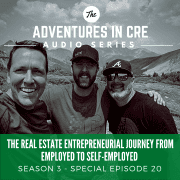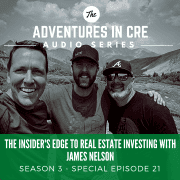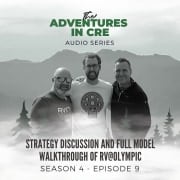From Ukraine: Pursuing a CRE Dream In Time of Conflict | S3SP17
In the midst of conflict and uncertainty, chasing a dream can seem like a daunting task. For Dima Nazarenko, who’s featured in this special episode of the A.CRE Audio Series, this aspiration was to establish a successful career in commercial real estate. Despite the challenges posed by the ongoing armed conflict in his home country, Dima remains undeterred in his pursuit of a career in CRE in Ukraine.
Watch, listen, or read this episode below to hear about how he got into the real estate industry and the challenges he’s faced during the armed conflict in Ukraine.
CRE in Ukraine – Pursuing a Dream In Time of War
Or Listen to this Episode
Resources from this Episode
Episode Transcript
Announcer (00:01):
Welcome to the Adventures in CRE Audio Series. Join Michael Belasco and Spencer Burton as they pull back the curtain on everything commercial real estate and introduce you to some of the top minds in the industry. If you want to take your skills to the next level and be part of a growing community of CRE professionals across the world, this is for you.
Sam Carlson (00:26):
Hello and welcome back to this episode of the podcast. This is going to be a very, very unique podcast. Let me start with this. We have a guest today that is currently living, residing in Ukraine. And obviously there’s a lot of things going on right now in Ukraine. So our guest’s name is Dima Nazarenko. Did I say that right, Dima?
Dima Nazarenko (00:48):
Yep, that’s fine.
Sam Carlson (00:49):
Okay, great. We’re excited to have Dima here and we’re going to talk about real estate. We are. We’re going to talk about that. We’re going to talk about his career that he’s pursuing in real estate, despite the obvious challenges that are happening. But I don’t know that this conversation goes in any one particular direction. I’m incredibly grateful that you’re here. I think that we’re going to learn a lot about what it means to really pursue a career and to pursue a dream in spite of some of these challenges. So thanks for coming.
Spencer Burton (01:26):
Can I set it up, Sam?
Sam Carlson (01:29):
Please do. I’ll turn over to Spencer. Let’s start with you, buddy.
Spencer Burton (01:31):
So for the viewers, listeners, how Dima and the rest of the CRE team got together. Dima reached out to us, I don’t know, Dima, it’s been a month or two, about joining our real estate financial modeling accelerator program. We thought that was so incredible. And why? Because I think when literally your world is falling apart around you, oftentimes we give up our plans, our dreams, what have you, due to the circumstances. And that’s not necessarily wrong to do that or to put your plans on pause, but we were so impressed with Dima and his continual progression to improve himself in the industry in spite of all of that. So Dima, let’s actually start with maybe, why don’t you give the audience your background? Where are you from originally? How did you get into real estate? And then we’ll go from there.
Dima Nazarenko (02:32):
Sure. First of all, thank you for having me here today. It’s also a unique experience for me as well because that’s my first podcast. I’m originally from Ukraine as you understand. I was studying in Austria, I finished three years or two years ago. And then after finishing, I came back to Ukraine because I landed a job in a private equity fund here, which was more generalistic, which focused on tech and agri. Back at my university times, I could never imagine I will end up in real estate. I did not even consider it. So I was working here in Ukraine in a private equity fund for one year, first as an intern, then promoted to junior analyst supporting with fundraising activities, portfolio management, looking for new opportunities. And then one year into the company, the war started and well, as you can imagine, half of our portfolio was in agri, so it was destroyed by Russian missiles.
(03:31):
And then we also could not raise our second fund of 150 mils because no one wants to invest in Ukraine when it’s a war torn country. So basically half of our team was let go, including me. And back then while I had no job, and while it was tough times because well, you were living yesterday in a peaceful word and today, you have war, I don’t know how to express it or how to explain this. Just back then when I’m reflecting back, it looked like in this movies. I exit the home one morning and I have a rocket flying about my head. So I mean, everyone was kind of lost back then, but we were trying to do something for our country. And after I was kind of fired… I mean, not fired but let go ’cause I mean, the fund would not survive. Together with my colleagues, we started a charity fund called Children of Heroes to support children who lost one or two parents during the war with Russia.
(04:35):
And this consisted of everything starting from humanitarian aid, financial aid, and now it’s one of the most actually successful charity funds in Ukraine in this realm. So far, we managed to raise around 60 million of Ukrainian hryvnias, it’s around two million of dollars. That’s not including the hub from partners. And we have right now around 3,500 children under supervision, let’s call it this way. I’m not directly involved anymore in day-to-day activities. I’m more kind of a co-founder and counsel sometimes on some matters. But it was a great experience back then to start this initiative to help people. And also back then the stories we heard from people… When I’m hearing people, oh, you’re from Ukraine, I’m so sorry for your situation, I’m always feeling a bit embarrassed by this because literally I’m in Kyiv, which is probably one of the safest places in Ukraine right now.
(05:39):
Back then, you could not even imagine what happened in cities like Mariupol or Donbas because I had stories which I would not probably share in this podcast, but I was having direct contact with people who lost someone. Small children who couldn’t find their parents, and this was awful. But coming back to my real estate trajectory. So as I said, I could never imagine the kind of working in a real estate fund. And I lost a job. I was working for some time in this charity fund, but eventually I wanted to go back to what I was doing before and what I was studying for. I could not land any job back then in private equity or venture capital because in Ukraine, well, there was nothing happening. Everything was on hold. And I also could not leave the country to go to Europe or somewhere else to work there. And most positions I applied for were on the ground.
(06:34):
But I found an opportunity super randomly, actually my colleague sent it to me and said, “Hey, probably you should try it out.” So I basically applied to global hotel operator for an analyst position there. I had several rounds of interviews and I got eventually accepted and basically that was a starting point. Back then I was thinking, hey, I’m going to stay here for what? Half a year, one year to survive because I needed money, but eventually it ended up being me trying to, first of all, exploring the hotel industry because that’s what I’m focusing right now. But in the future I want to actually expand. I mean, I’m not planning to leave or anything. I’m trying to get as much experience as possible right now, but I would also like to get more involvement or exposure to also office real estate or retail.
(07:32):
So probably what I’m doing on the everyday basis, well, that’s grows. It’s an actively growing… It’s actually global hotel operator, which is growing quite actively. Not the kind of, how do I say it? It’s not like Hilton or Marriott where you get a place to sleep, but very luxury. It’s more unique ’cause we’re offering accommodation in off the beat locations, unique accommodation, alternative accommodation in places all over the world like Panama. For example, we have a project in Panama in Red Frog which I like a lot because it’s very unique and people get their really immersive experience because it’s on the remote island and you can get there only by boat. And when you come there, it’s basically you are in the middle of the jungle and you have their tepees and shared accommodation. You have different wellness, yoga classes, also a lot of focus is put on programming.
(08:35):
So it’s a community in the middle of the jungle and it’s very cool. I’m seeking out properties like this, seeing how we can refurbish them, renovate them, put them under our brand and kind of move it forward. So I’m taking everything from either reaching out directly to the landlords where their assets are underperforming and then they’re looking for someone who would take it over or I’m talking to the brokers and then analyzing it, all the KPIs, ADR, so occupancy, cap rates in the area, see if it would be feasible for our brand and then lead it forward.
Spencer Burton (09:18):
I think first off, it’s incredible how small our industry is that we’re speaking with Dima in Kyiv, Ukraine. Dima is working on a project in Panama called Red Frog that both Sam and I know, in fact we know the original developers of the site. I think they ended up selling it to a different group while developing in Panama. And how the world goes full circle, at least in our small industry. And I say small, it’s big. Now in terms of the scope, let’s stay on the scope of what you’re working on now and then we can dig back into what it’s like working in a war torn country in real estate. You mentioned an asset in Panama. Do you have any hotel assets in Ukraine or is everything you’re working on outside of Ukraine or even outside of Eastern Europe?
Dima Nazarenko (10:12):
Unfortunately not in Ukraine. Also, I’m always saying that Ukraine is very underdeveloped in that regard because just it is this off the beat, this nation that people don’t really know about. And I’ve had friends from Europe and then US visiting Ukraine a lot of times and then they’re saying, “Hey, that’s such an amazing destination, so many nice people. And you have everything here. You have have jungles, you have pink lakes, you have mountains.” So there is a lot to do and I wish at some point in the future I could bring here some brand.
Michael Belasco (10:49):
So the company you’re working with now, are they headquartered in Ukraine? Where are they headquartered? And if they’re not in Ukraine, how did you go about procuring your job? I’m just curious to hear more about that.
Dima Nazarenko (11:00):
No, it’s not in Ukraine. It’s not related to Ukraine in any way. I’m working remotely, actually. We have four headquarters, actually. One in New York, and then the other one is in the UK, London, Spain, and then Tel Aviv, Israel. And we have properties all over the world. It’s literally under every continent from LATAM to US, Europe, and then also Australia and Africa. So literally under every continent.
Michael Belasco (11:27):
So how did you position yourself? I’m sure it was an active… I mean, I’m sure you responded to some job opening. You have no experience in real estate or in hotel industry in particular, how did you position yourself or what advice could you offer to others that are in your same position even from around the world, I guess? How did you position yourself to get into this job and it’s such a different industry?
Dima Nazarenko (11:53):
Look, I think it’s very similar to what I was doing before. I mean, in the private equity fund, and we were thinking, okay, so how can we drive revenue? So how can cut operational expenses? And I think it’s very similar to the hotel. Okay, you have the ADRs, you have basically how you drive revenues, you have F&B. You think, okay, how you can turn it around and then of course, the operational expenses. So back then I was basically given the task of look at this PnL and see what’s wrong with this. Look at the GOPs, how well it is performing, where do you think you would cut or what would you suggest? And back then my idea was, okay, so we have a hotel somewhere, let’s say in Black Forest in Germany and the operational expenses, let’s say were super high.
(12:40):
So I was saying, okay, so Black Forest is such a huge destination. We have a small key destination for 40 keys. Why not create a real destination like Black Forest, put three, four hotels there, have one GM, cut in operational expanse and at the same time, increase the GOPs? So was back then I was applying for a junior position, so I guess the requirements were not that high. Basically they needed support, but eventually with time, I got exposure and I started with focusing on EMEA, and then now I’m working on basically projects all over the world. But that was my interview.
Michael Belasco (13:20):
And that’s great. We often give that advice actually for people who are transitioning, is that you may take a step backwards in job title, but from that experience, and you outlined it perfectly, you’ll rapidly excel just because of where you were in a… It’s different but somewhat similar industry as you outlined so well. That temporary step back actually could be a great springboard into a new industry and you’ll excel a lot faster. Great.
Spencer Burton (13:47):
Dima, how has it been though working remote from a country that’s currently at war? You mentioned before we started that you’ve had periods where you had bombing raids happening and your power’s out and you’re having to go to, you said the corner store where there is some internet. Help the audience get a sense for what life is like for you working in Ukraine right now.
Dima Nazarenko (14:15):
Basically those were crazy times. Sometime in August last year, I would say, yeah, around August, September last year, basically Russia started firing a lot of missiles all over Ukraine in the capital and then other regions. And basically their idea was to try to cut our basically utilities like electricity, gas, water. Well, and they managed. So for example, there were days where we’re sitting for three, four, five days without electricity or without water or without post. And at these times, well, you don’t have electricity, you don’t have wifi. So back then I had to easily change places five times a day. In the morning I’m going to the cafe where there is an electric generator and they have WiFi here so I’m going there. I work there for four hours. Then for example, I’m going to my mom’s home because we also used to have this, I’m not sure how to explain it, but basically the city as a whole there are a couple of districts, and then each district has been turned off from electricity at a time.
(15:23):
So I had to run from one place to another place, and so I was working at my mom’s and at my mom’s they got cut off electricity. I was going to the gas station because while at the gas station, once again they have the electric generator. I was working from there, and that was continuing for four months or so. So it was crazy. And at some point I was like, “I can’t do this anymore,” but I think at some point this job actually helped me go through this because… Well, I think the good thing about the real estate that well, you kind of knew and at my position you really get to explore a lot of opportunities all over the world and I really get into each of them. And back at that time, it helped me distract from what’s happening in my country that somewhere else we can create something really cool.
Sam Carlson (16:23):
You said that was last September? Is that when you said you were saying this was happening?
Dima Nazarenko (16:30):
No, it happened for a couple of months. Like September, October every one or two weeks they were firing missiles and then they targeted some electric station and then, well, we didn’t have electricity, but then basically the technicians they managed to repair it. And then the thing over and over again like this, and this was continuing for four months. I would say for the last month or month and a half, this air attacks they stopped because apparently Russia’s running out of missiles or something because they were firing a lot of them. So now we have the normal supply of electricity and water and it’s much better. It feels like a blessing to be honest these days.
Sam Carlson (17:12):
And you’re Kiev, is that right?
Dima Nazarenko (17:16):
Yeah, I’m in Kiev. Yep.
Sam Carlson (17:17):
And so what’s the day-to-day? Are people walking around, moving and just acting “normal?” And I put in air quotes, if you’re listening, whatever normal is right now. Are they moving around and conducting business one with another and things like that? What’s happening today?
Dima Nazarenko (17:37):
In Kiev, everything is open. You can go to the cinema, you can buy food. You have everything here basically.
Sam Carlson (17:43):
Okay.
Dima Nazarenko (17:45):
Well, I don’t know if it’s the right way to say it, but if you don’t read the news you don’t feel that there is war in Ukraine because in Kiev everything is going normal right now. We don’t have air attacks, people are going out. Just for the past half a year, one year or so, like 400 days actually that the war started, basically you wake up and you start reading news and you see that something happened. And of course, well, this affects your mood, but otherwise the business is going on. Actually even the investment industry started to pick up, there are some investments in tech right now in Ukraine. So we survived actually, and we do good right now.
Michael Belasco (18:26):
So I want to ask you to the extent that you’re aware in Kiev, I’ve never thought about this or learned about it or anything, how has the war impacted the real estate industry and business? Whether it’s rents for office or residential or just people purchasing houses and things like that? And I know you said things have kind of stabilized and the movies are open and all that, what has the impact been from the start of the war to now if you’ve been paying attention? I know you’re doing international real estate in a hotel, I’m curious to what you know and if you could share anything on the ground.
Dima Nazarenko (19:01):
Well, so actually I think real estate in Ukraine was one of the industries that it was impacted the most because if you’re talking about the big cities like Odessa, Kiev-all the development stopped, all the development developers they put their assets on hold so nothing is built being built here. And then on the other hand, if you’re talking about the Western Ukraine, because basically when the war started a lot of people actually moved to Western Ukraine because they considered it as a safe haven, let’s put it this way. So there the development picked up, especially, how do I say it? More short-term rentals and then cottage house and stuff like this. But if you’re talking about big cities, well, nothing is happening here right now. I have actually friends who invested into real estate last year and well, they’re still losing money because it did not pick up and no one knows when it’s going to pick up again.
(20:01):
And then on the other hand, so in terms of rent, I’m going to tell for residential because, well, hospitality is not that developed in Ukraine and I can’t provide much insight there. But during the war, during these months when we had electricity cuts and then no utilities, basically the Radisson Kiev, which is normally one of the most expensive cities in Ukraine, they went down. Whereas Western Ukraine Lviv, Chernivtsi, it picked up. Well, people who are renting places there is no point for them to rent in Kiev when they can go somewhere else where there is more stable supply.
Michael Belasco (20:43):
Even with war, it’s the supply demand fundamental. Migration to the West, and therefore there’s more demand now. That’s fascinating.
Dima Nazarenko (20:50):
But also one interesting thing to me, I just got to know this recently that in Ukraine we have no single international developer involved. So it’s all local Ukraine developers because of the country risk, because international developers don’t want to enter the country because, well, we had war from 2014. It’s not like war started in 2022 because there was Donbas.
Spencer Burton (21:16):
What strikes me from the conversation Dima, and thank you for coming on. And for the audience, so Dima’s also agreed to contribute some of his knowledge to our international real estate series, so you’ll see his name pop up on our blog a time or two, which is very kind of him. But what strikes me about this conversation is that adversity, challenges are all relative. And for many of us in the industry, our biggest adversity is our capital partner drops out our tenant vacates, but it could be a lot worse. And so to you Dima, as you were living a relatively normal life or a very normal life, right? You’d gone to a great university, you come back, you’re working in an interesting firm, you’re just starting your career, you’re excited and all of a sudden war hits, and now your life seemingly gets turned upside down.
(22:20):
What was the mindset, the mentality that you had that helped you to move beyond that and say, look, I need to continue to grow in my career and to seek out opportunities like the firm that you’re working at? What’s the mindset? What advice could you offer someone else that’s going through challenging times, whether their tenant left or a family member passed or their business went out of business or their country goes to war? What’s some advice that you could give people that will help them have the resolve to continue to grow and to seek out opportunities?
Dima Nazarenko (22:59):
Look, I think it’s also very kind of particular to my situation because when the war started, there was this feeling of connectedness between all of Ukrainians. Everyone contributed in their own way. Someone was at the forefront fighting Russians, someone was paying taxes, someone was donating to different funds to buy drones, to bring them once again, to the battlefield. And I think because everyone was doing something to help our country, to help Ukraine, this was also moving me kind of forward. The thing is, Ukrainians are very creative when they need to, and also the war… Right now in Ukraine there are several campaigns when they’re collecting money on different initiatives, starting from just supporting ordinary people, humanitarian help and finishing with buying drones or equipment for military. And it’s being advertised very actively in a very interesting way. So it’s kind of a quest for you how much you can donate to each of these funds.
(24:16):
So this was kind of one, so I wanted to be able to help my country, if not at the forefront, the battlefield, but with something that I can supply someone with either like medicine or West or something else. And then second thing is, well, look, I was always career oriented. I always wanted to grow in my career. But the thing is back then when I was working in a private equity fund, I didn’t feel like it was my place. And I’m not sure it’s whether because, well, back then you were an intern and you don’t get as much exposure to all the things to actually learn stuff and do stuff and be able to see the way how you can contribute to this organization. But here when I switched to real estate, so first I think the industry just caught me. That’s one, but also the second thing is because here I have the opportunity to actually go find some projects which I think are interesting, and show them to the senior management, see what they say on that.
(25:23):
So I have kind of a say, and I see the way for myself to develop here. I see the way for myself how I can contribute, and I just like what I’m doing. So I think that’s this two components basically.
Sam Carlson (25:37):
Wow. And I know it’s an incredible story filled with struggle, filled with rising to the occasion and all these things. That’s fantastic. Your initial reason for reaching out to Adventures in CRE, and correct me if I’m wrong, was because of your new position and your entry into commercial real estate was to take your skills and start developing them further. And so you’ve started it, you’re beginning the accelerator, is that correct?
Dima Nazarenko (26:12):
Yeah. Well, I’m just beginning to be honest because at the same time I’m preparing for CFA, chartered financial exam.
Sam Carlson (26:20):
Okay.
Dima Nazarenko (26:21):
So it’s a bit tough. And then I also have work, and then I also have family, so I’m kind of juggling around. So I’m very at the beginning, but yes, so the thing is actually before going into this interview with the place where I work right now, I did the course from Wall Street Prep, and I’m pretty sure that you probably know this. It was good, but I felt like it was a bit… It is a good course and it helped me a lot probably to get this job and actually get the understanding of the real estate. It was very, very high level probably that’s the word, and then the colleague recommended me, hey, look into the Adventures in CRE. And I looked at your curriculum, which was very experience based and then I never saw a course which offered deep dive into hotel PnL and hotel investments, how they function. So that’s what also caught my interest.
(27:19):
And it’s very expansive. You cover a lot of topics. You give a really good insight into every area because as I told at the beginning, I’m working in hotels right now and probably that’s where I’m going to stay, but probably I also want to explore. Sometimes I want to explore, I want to go beyond because, well, unless I try something else, how can I know that I like hotels? That I want to work in the hospitality in the future? And that’s a way for me to also kind of see, okay, so what’s happening out there? And that’s why it’s so much interesting for me.
Spencer Burton (27:56):
They say never stop learning, right?
Dima Nazarenko (28:00):
Yeah. Never stop learning.
Spencer Burton (28:01):
Never stop learning. If there’s anyone who has an excuse to take a pause on learning it’s Dima, and yet it’s incredible what you do. And the CFA together with the accelerator at the same time, that is a heavy lift. It’s really impressive. I’m confident that 30 years from now, we’re all going to hopefully sit around a table somewhere, Dima and you’re going to be a titan of real estate in your part of the world and we’ll be grateful to have met you. So thank you for your time. Sam, I’ll let you wrap it up.
Sam Carlson (28:31):
Yeah, this has been really awesome Dima, and thank you so much. For everybody listening, our struggles and the things, the challenges that we have, they’re all relative. And this has been for me, an enlightening conversation. Very good. Thanks for listening and we will see you on the next episode guys.
Announcer (28:51):
Thanks for tuning into this episode of the Adventures in CRE Audio Series. For show notes and additional resources, head over to www.adventuresincre.com/audio series.








